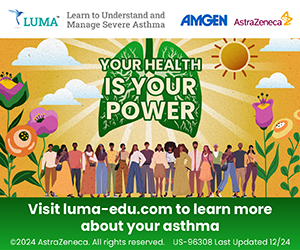Don’t Let Peak Asthma Season Leave You Breathless
In LA County, an estimated 1.2 million people have asthma, and statistically about 60% of them – or 720,000 people – may not be well-controlled.1
As we head into the Fall, those with asthma are at serious risk, because the third week of September is known as Asthma Peak Week, when we typically see a spike in asthma attacks requiring emergency room visits and hospitalizations.2 This is especially true for Black Americans, who are 1.5x more likely to have asthma and 5x more likely to visit the emergency department due to asthma than white Americans.2
There’s a perfect storm of factors happening this time of year that contribute to this spike: 2
- Fall allergy and asthma triggers like ragweed and mold
- Cooler weather means more exposure to indoor allergens like dust and danger, and
- An uptick in circulating respiratory viruses as kids go back to school
While this week is statistically among the most dangerous for asthma patients, peak asthma season will continue well into the winter, so now is the time to take control of your asthma so that you can breathe easier and don’t land yourself in the ER.
The good news is that asthma, even severe asthma, can be manageable with the right medications. But many people accept difficulty breathing as a way of life and don’t realize that they can have better control over their asthma. That’s why Amgen is partnering with Dr. Renee Matthews, a physician and asthma and allergy expert, to help Angelenos living with severe asthma prepare for the season.
“Only a physician can determine if someone with asthma is well controlled, so please call your specialist – an allergist or pulmonologist – today to make a catch-up appointment, whether you think your asthma is well controlled or not. Even if it’s over telehealth,” says Dr. Renee. “To help prepare for that appointment and better understand your level of asthma control, a good way to gauge is the ‘Rules of Two’.”
The asthma “Rules of Two”, states that your asthma may be uncontrolled if you3:
- Have asthma symptoms or use your rescue inhaler more than 2x per week
- Wake at night with symptoms more than 2x per month
- Refill your rescue inhaler more than 2x per year
Another important factor in understanding your asthma is knowing what your specific asthma triggers are. The average person with asthma has about eight triggers that can cause symptoms or attacks, and these can change over time. Common asthma triggers include air pollution and smoke, allergens, viruses, exercise, the weather, and even emotions like laughing, crying or stress.4 If you’re unsure what your triggers may be, your doctor can help you identify them and personalize your asthma management plan to help them.
“Every patient’s asthma journey is unique, including the medications used to help control it,” Dr. Renee explained. “Medications can help cut down on asthma attacks and improve your daily symptoms. Inhalers are most often used for both quick relief of symptoms and long-term control. But there are newer, targeted therapies for asthma that patients with more severe disease may qualify for. Ask your doctor about treatment options to help control your asthma and help reduce asthma attacks, which may include a biologic.”
To learn more about how you can better understand and manage your severe asthma during the Fall Peak Asthma season, listen to KBLA’s full interview with Dr. Renee and visit www.luma-edu.com.
References
- “Proclaiming World Asthma Day in the County of Los Angeles.” Holly J. Mitchell, Los Angeles County, Available at: https://file.lacounty.gov/SDSInter/bos/supdocs/191076.pdf. Accessed August 2024
- “Brace Yourselves: The Biggest Time for Asthma Attacks Is Coming.” Asthma and Allergy Foundation of America. Available at: https://community.aafa.org/blog/September-Asthma-Peak-brace-yourselves-the-biggest-week-for-asthma-attacks-is-coming. Accessed August 2024
- “Assess and Monitor Your Asthma Control.” American Lung Association. Available at: https://www.lung.org/lung-health-diseases/lung-disease-lookup/asthma/managing-asthma/asthma-control. Accessed August 2024
- “Asthma Triggers.” Asthma and Allergy Foundation of America. Available at: https://aafa.org/asthma/asthma-triggers-causes/. Accessed August 2024









